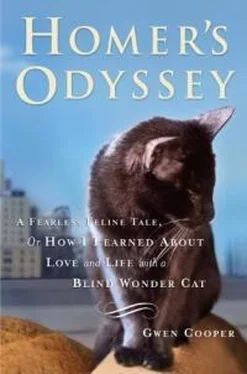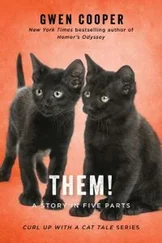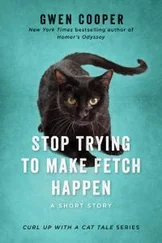Besides, the two of us spent most of our time together out and about. Laurence had been born in Brooklyn, raised in New Jersey, and moved to Manhattan almost as soon as he’d graduated college. He was deeply in love with all things New York and, consequently, was the one I roped into all the touristy New York things I was dying to do. We went to Ellis Island, where I found the official record of my great-grandparents’ arrival in the United States, and to the Statue of Liberty. We went to the top of the Empire State Building and to the West Village dive bars and subterranean restaurants where, a hundred years earlier, some of our favorite writers had caroused and drunk themselves to death. At the Museum of Modern Art, I was surprised to learn the depth of Laurence’s knowledge of modern art—far deeper than my own. Laurence was also a theater buff and procured tickets for everything from Henry V at Lincoln Center to Sock Puppet Showgirls downtown, which was—as its name would imply—a live-action take on the film Showgirls as acted by an all-sock-puppet cast. (Word to the wise: You haven’t experienced the true glory of live theater until you’ve seen sock puppets pole dance.)
By now, you’re probably saying, Okay … surely this paragon of male virtue had at least a few flaws. It couldn’t all have been this idyllic, could it?
Well, it is my sad and solemn duty to inform you that Laurence Lerman was a hoarder. He lived by himself in a rent-controlled, three-bedroom apartment that he’d occupied for nearly twenty years, and it was packed to the rafters with … junk. He had stacks of newspapers, magazines, comic books, and action figures. He had the Playbill for every play he’d seen since moving to New York, the ticket stub from every concert he’d attended since middle school, and a matchbook from every restaurant he’d dined in over the past two decades. Once, on a lark, I weighed his matchbook collection. It weighed over seventeen pounds. “That’s probably a fire hazard, you know,” I told him, and it was shortly thereafter that I began referring to him as Templeton, after the pack rat in Charlotte’s Web .
I should hasten to add that, given how much space Laurence had, the vast bulk of these things were neatly stored in closets and drawers; he wasn’t one of those crazy people you read about who lives their everyday lives amid towering piles of discarded stuff. Laurence’s apartment was invariably tidy, and you wouldn’t have known all that stuff was there unless he made a point of showing it to you.
Still, I was a reader and apt to think in metaphors. It struck me that Laurence wasn’t leaving any room in his inner life—literally or figuratively—for the addition of another person.
Laurence also had a fearsome temper, one thing even the people who knew him best would never deny. It wasn’t frequent, but it was deadly. His anger came from some deep, physical source, and he would seem to come at you like a bull. Laurence wasn’t a person who you normally thought of as physically intimidating, and to my knowledge he never struck another person in his life, but I’ve seen people twice his size back up when Laurence was angry, instinctively fearful for their safety. His deep, booming voice, which I loved so much, became a brutal weapon when Laurence was angered. It roared at ear-shattering volume, and—if he was especially enraged—he was capable of saying very cruel things. The unfailing brilliance Laurence had in knowing exactly what questions to ask you, the questions you would be most interested in answering, let him know intuitively what things it would be most painful for you to hear—and he would say them.
I had found it easier to stand up to the burglar in my apartment than I did to stand up to Laurence when he was in a temper. I had a deep-seated dislike of loud “scenes,” and my response, on the few occasions when we were really furious with each other, was to coldly withdraw. “Clearly,” I would tell him in an even voice—a voice that was deliberately many decibels lower than his—”you are not capable of discussing this rationally right now.” Then I would leave.
I would have said that I was merely trying to have a “productive” argument, as opposed to an illogical and unfocused one. Laurence would have said, sighing in mock dismay, that I was simply no fun to fight with. What was less fun, when you felt like screaming, than somebody who wouldn’t scream back?
But when we had calmed down, we were both anxiously willing to listen to what the other one had to say. It was more painful for me to be at odds with Laurence, to feel that I had somehow compromised his good opinion of me, than it was with any other person I knew.
And to his credit, Laurence never had to be told when he had gone too far, never had to be bullied into making an apology. If Laurence was sure he was right, you’d never get him to apologize simply for the sake of making you like him again—but if he knew he was wrong, his remorse was instantaneous and no false sense of pride kept him from expressing it. Yet he was never one to plead for forgiveness. Laurence was precisely aware—without, as far as I could tell, ever having to consciously weigh the matter—of the extent to which he was wrong and how much restitution he owed. Beyond that, you could take it or leave it.
I think it was that utter lack of affectation—that core inability to do or say anything, or to refrain from doing or saying anything, merely so you would like him, or forgive him, or think of him a certain way—that ultimately made Laurence who and what he was. It was the thing that made him not a guy, but a man . One of my favorite novelists, Anthony Trollope, once wrote: “The first requirement of [manliness] must be described by a negative: Manliness is not compatible with affectation.”
Laurence was innately incapable of doing that which was essentially wrong or unmanly. It was the quality that all his other good qualities stemmed from—how he could be funny without ever being obnoxious; how he could talk without trying to dominate a conversation, and listen without being impatient. He was never remotely envious of the success or attainments of those around him. He would share his time, money, and possessions with lavish generosity, but nobody was ever foolish enough to make the mistake of trying to take advantage of him.
I had to think about the balance of things like this all the time. I would never be as instinctively close to getting it all right as Laurence was. And as the years of our friendship passed, it was what I came to respect and admire most about him.
I had never known anybody quite like him.
OBVIOUSLY, I WAS in love with him. Just as obviously, I was the last one to know it. By the time we were close friends of some three years’ standing, it seemed as if somebody asked me every day why the two of us weren’t a couple. I always demurred when this question was asked, although not from coyness or any attempt to deny the obvious. My experience with falling in love was that you met someone, were attracted to him right away, and then, as you got to know him, figured out if that attraction was substantive or merely the delusion of a few weeks. I had never experienced love the other way around—where first you got to know somebody and then realized your interest was deeper than friendship. Having never experienced it, I didn’t recognize the thing when it happened to me.
Truly, there are none so blind as those who will not see.
Then one late-summer Sunday afternoon, as Laurence and I shared hot dogs and piña coladas at a beachy, outdoor grill at Chelsea Piers, he told me that he was dating someone, and my world fell apart.
It wasn’t as if Laurence and I had passed the three years we’d spent not-dating each other also not-dating anybody else. Various boyfriends and near misses had come and gone, and I had shared with Laurence the details of all of them. Now that I thought about it, though, I realized Laurence had never discussed with me the women he’d been involved with. It wasn’t that I’d assumed he’d remained celibate all this time. Truth be told, I hadn’t thought about it much at all. I had taken it for granted that a man like Laurence would have a hard time finding a woman who could capture his serious interest, but that when that woman came along, he would tell me about it.
Читать дальше












